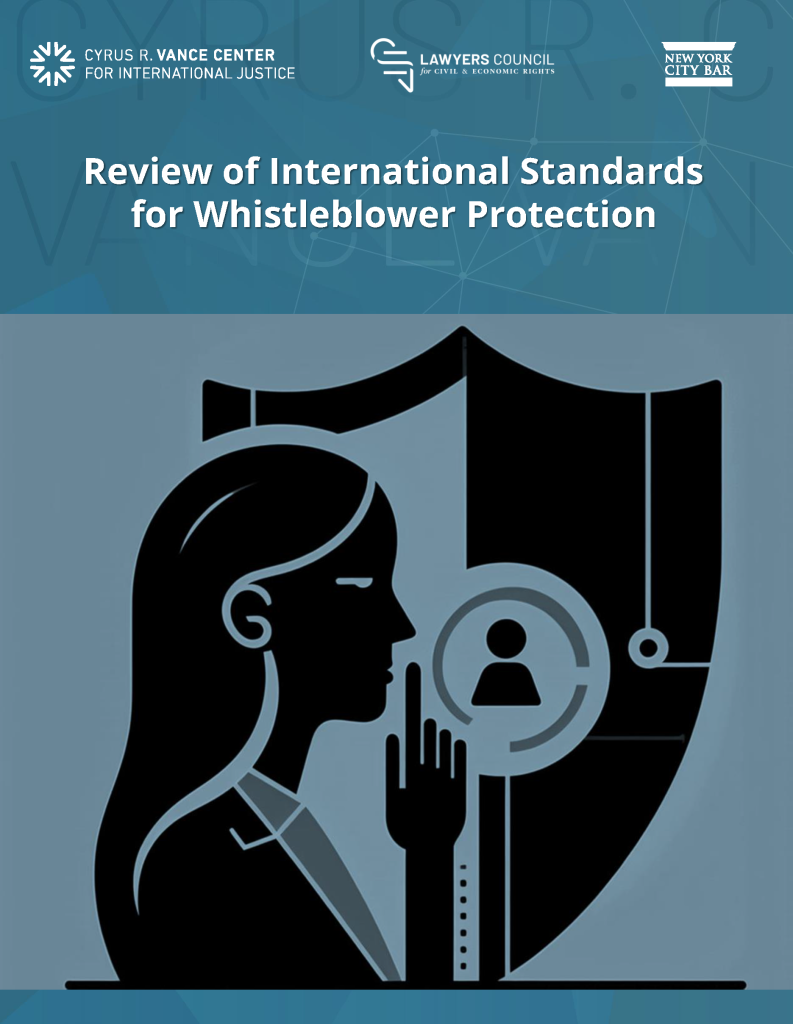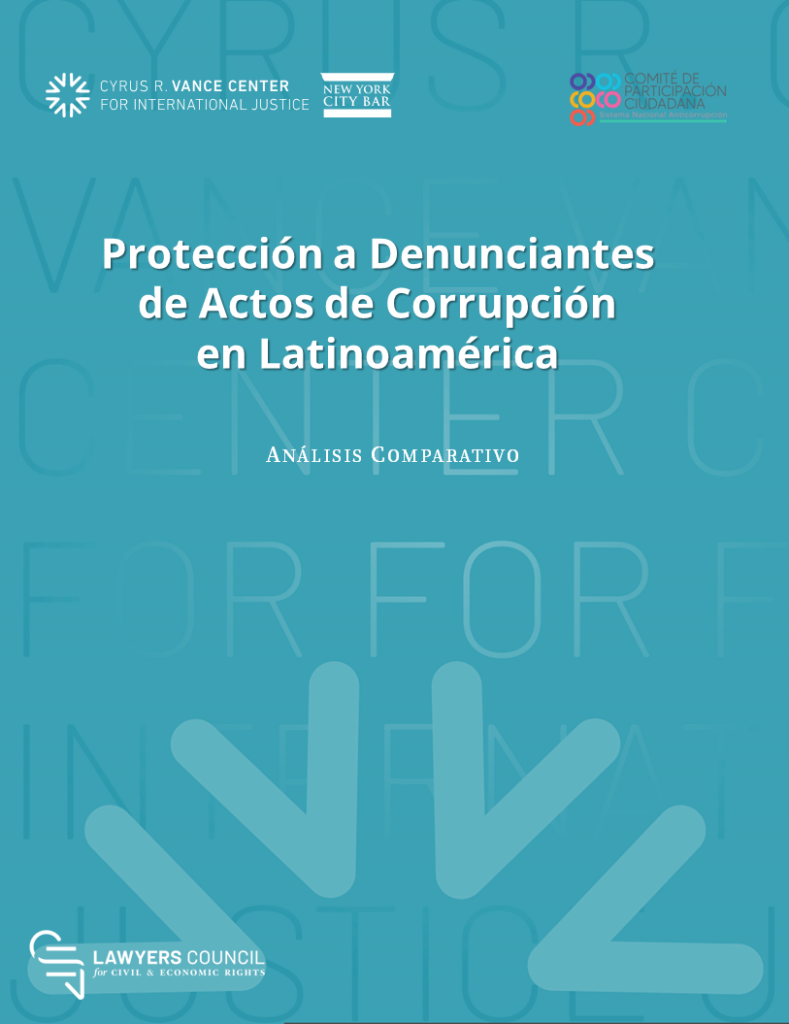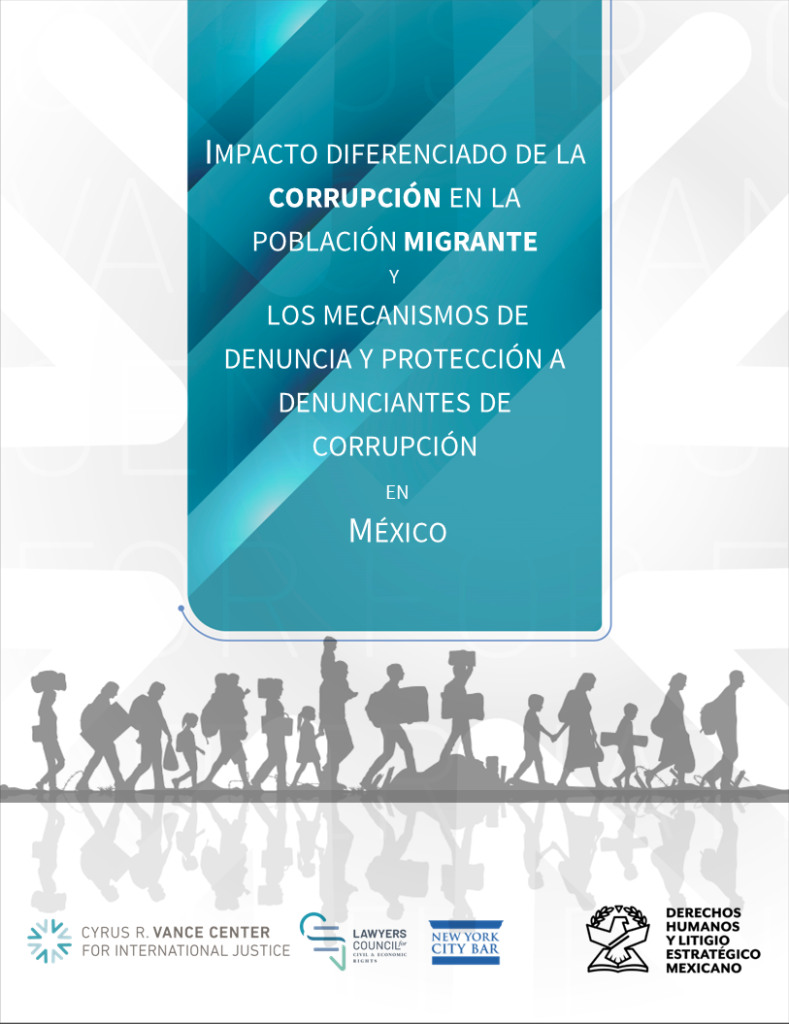Vance Center Continues Anti-Corruption Efforts with Reports on Whistleblower Protections and Migration
January 2024In three new publications, the Vance Center analyzes international standards and regional practices for whistleblower protection and the differentiated impact of corruption on migrants.

As part of its ongoing work to support anti-corruption initiatives, the Vance Center recently partnered with civil society organizations in Mexico and regional pro bono partners and law firms to produce resources on under-reported issues related to corruption.
The Vance Center’s most recent Latin America Anti-Corruption Assessment identified whistleblower protection as an under-emphasized aspect of anti-corruption efforts in Latin America. The report found that whistleblowing can be an effective mechanism for asset recovery, risk prevention, and helping detect irregularities related to corruption. Whistleblower protection is therefore essential to combat corruption and promote transparency and accountability. Although several countries have made the fight against corruption a key part of their public agenda, there is a discrepancy between discourse and reality, and a number of countries still do not have national whistleblower protection legislation. In half of the countries covered by the assessment, the analysis found nonexistent or inadequate whistleblower protection mechanisms – a gap that disincentivizes reporting acts of corruption.
In response to this issue and to better inform ongoing regional conversations and policy around whistleblower protection, the Vance Center recently released two reports:
Whistleblower Protection in Latin America: A Comparative Analysis
This report presents a comparative overview of progress made and pending issues in the legal framework for protection of whistleblowers in 11 Latin American countries: Argentina, Brazil, Colombia, Costa Rica, Chile, Ecuador, Mexico, Panama, Paraguay, Peru, and Uruguay.
The report found a lack of incentives for reporting, and inadequate resources allocated to implement programs to encourage transparency and whistleblowing in most jurisdictions. It offers recommendations to address these gaps, including crafting more detailed regulations and implementing campaigns to increase awareness about existing protections.
The Vance Center published this report in collaboration with the Citizen Participation Committee, the civil society-led governing body of Mexico’s National Anti-Corruption System. The Committee is currently leading discussions in Mexico to create national whistleblower legislation, informed by regional best practices.
Other key contributors to this report include Dentons, which provided essential research on each country, as well as Derechos Humanos y Litigio Estratégico Mexicano, A.C. (DLM), Transparencia por Colombia, and the Pro Bono Commission of the Buenos Aires Bar Association.
The report is available in Spanish here.

Review of International Standards for Whistleblower Protection
This report analyzes the international regulatory framework for whistleblower protection, aiming to provide the legal community with points of reference on standards with which countries should comply. It includes a general review of conventions on corruption, guidelines for whistleblower systems, recommendations to combat bribery, directives, recommendations, and regional agreements or conventions, all of which are international instruments against corruption worldwide.
The review covers detailed identification for each instrument, including key provisions, standards, any applicable definition of “whistleblowers,” reporting procedures, protections against retaliation, and whether there is a distinction between protection of public officials and private individuals, and identifies international standards in both civil and criminal law. This review serves as a reference for decision makers in Latin America and other regions with a need to develop or strengthen the regulatory framework for whistleblower protection.
Law firm Mayer Brown LLP provided essential research for this report, which is available in English and Spanish.
********
The Anti-Corruption Assessment also found that regional corruption has a distinctive impact on migrants – an underreported but important consequence of corruption. To further explore this issue, the Vance Center partnered with Mexican human rights organization Derechos Humanos y Litigio Estratégico Mexicano, A.C. (DLM) on a third report:
The Differentiated Impact of Corruption on the Migrant Population and Mechanisms for Reporting Corruption and Protecting Whistleblowers in Mexico
Throughout Latin America, migrants are a vulnerable population group and one of the most affected by corruption. This is especially relevant in Mexico, a key transit country for migrants moving through the region. This comparative study presents the legal framework for the human rights of migrants, whistleblower protection, and mechanisms for reporting corruption. Migrants in transit through Latin America and Mexico are exposed to sextortion, extortion, illegal criminal charges, abuse of authority, bribery, influence peddling, and other illegal activities along the lines of “if you don’t pay, you don’t pass,” all of which contribute to systemic corruption. Criminalization of migrants by authorities and mismanagement around bringing in the Mexican National Guard to administer state migration delegations have only exacerbated these dangers.
The report includes the regional overview of Mexico from the comparative analysis and offers a comprehensive overview of the tragic consequences of a failed migration policy. It identifies clear examples of abuses and human rights violations, collects testimonies documenting clear cases of systematized corruption, provides information on existing hotlines and other options for internal and external whistleblowers, and offers detailed information on their protection.
The report is available in Spanish here.



